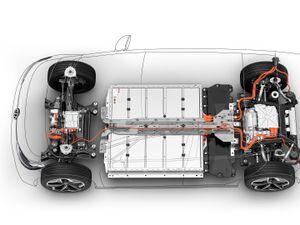Making EV batteries from deep sea rocks is better for the environment, suggests study
Research suggests carbon footprint reduction of up to 90 per cent.

Electric vehicle battery production could reduce its carbon footprint by up to 90 per cent by using polymetallic rocks from the deep-ocean floor in their construction.
A study published in the Journal of Cleaner Production compared the life cycle of EV battery metal sources, looking at direct and indirect emissions from the beginning of the mining process.
Researchers investigated beyond the human operations and also looked at the disruption of the ecosystem that came from using these materials.
The case study worked on the basis of creating one billion 75kWh electric vehicle batteries and compared the climate change impact of providing the necessary metals from both conventional ores found on land as well as polymetallic rocks found unattached on the seafloor. These rocks have high concentrations of the four required metals in a single ore.

It found that producing the metals from these deep ocean rocks can reduce active human carbon dioxide emissions by up to 75 per cent, stored carbon at risk by up to 94 per cent and disruption of carbon sequestration services by 88 per cent.
The study’s lead author, Daina Paulikas of the University of Delaware’s Center for Minerals, Materials and Society, said: “We wanted to assess how metal production using either land ores or polymetallic nodules can contribute to climate change.
“Looking from mining to processing and refining, we quantified three indicators for each ore type: direct and indirect carbon-dioxide-equivalent emissions, disturbance of existing sequestered-carbon stores, and disruption of future carbon-sequestration services.
“These three indicators directly impact the remaining global carbon budget to stay below 1.5C warming.
“We hope this work motivates others to dive deeper into supply chain analysis for the clean energy transition, and specifically to pay attention to the impacts of producing critical minerals like the ones we studied.
“Given the expected 500 per cent increase in mineral requirements for clean technologies, I think we have a shared responsibility to take a planetary view and think through all aspects of mineral production to ensure that this resource-intensive transition does not exacerbate climate change.”





